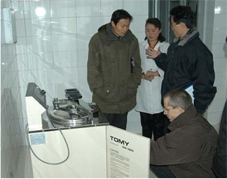Three weeks after the Asia tsunami disaster, the death toll is now estimated over 159,000 (this figure is now anticipated to rise to over 189,000), with over 24,000 still missing. Some 2.2 million people have been displaced while over 1,026,000 are believed to be homeless. These figures are expected to increase.
Relief efforts are still critical: Some populations in remote areas in Banda Aceh Province in Indonesia remain difficult to reach. Treating injuries from the tsunami and earthquake is still a concern.
In India, the Maldives and Sri Lanka, reconstruction efforts have started simultaneously with the relief efforts. No disease outbreaks have been reported. Isolated cases of measles in Aceh prompted an immunization campaign. Access to safe water and sanitation remain of critical concern. An effort is underway to support countries in rebuilding public health infrastructure, while guiding and coordinating public health efforts among national authorities, other UN organizations, NGOs, and the civil and military sector.
In Indonesia, a command centre has been established in Medan, where the Seventh-day Adventist Church has a hospital and from which, ADRA activities are being coordinated in the region. ADRA medical teams have been very active for the last two weeks. Two clinics have been established in the northern coastal region of Aceh Province. A 16-member medical team opened a clinic at the Sibreh Public Health Centre in Sibreh (15 kilometres outside of Banda Aceh) and a second clinic has just been opened in Lhokseumawe (400 KM from Medan) where there are 8,000 Internally Displaced Persons (IDPs). ADRA-Spain is sending a container of supplies into Banda Aceh in conjunction with Medan Adventist Hospital.
In Meulaboh, ADRA continues to maintain a presence and is coordinating relief efforts with other agencies and has been able to facilitate the distribution of food and shelter. Equipment has arrived that will treat acute respiratory infections and damaged lungs. ADRA has distributed anti-typhoid and anti-malaria injections and tetanus treatments for about 600 people. ADRA Indonesia met with the Meulaboh Education Department and is working on a Memorandum of Understanding in regards to repair and reopening of schools and is hiring two teachers to help facilitate the process. UNICEF has asked ADRA to be the lead agency in the repair and refurbishing of junior and senior high schools and to help coordinate the donated supplies, logistics and liaisons with Education officials in Meulaboh and other NGO's.
In Sri Lanka, two ADRA field offices have been set up, one in Tangalle and another in Balapitiya (near Galle). A medical team, consisting of 2 doctors, a nurse, and a social worker from ADRA Hungary, is in the eastern region of Kalmunai and will be their for the next 10 days. A fogger project has started and has disinfected 3 temples and a school. With more fogging and protective equipment just arrived, ADRA will start training the Sri Lankan military to continue with this important health work.
ADRA is partnering with Heart to Heart who is providing water purification units that are due to arrive this week. Medical aid distribution is ongoing and helicopters are being used to airlift in supplies. ADRA will be distributing food and non-food items (NFI) to internally displaced people (IDPs) in 17 camps.
In India, ADRA has begun a response in the Andaman Islands to set up shelters for 200 families and health education for children and IDPs in the Pondicherry and Karaikel region. A project to deliver NFI and health education to IDP camps on the Andaman Islands will begin next week. In Andrah Pradesh ADRA will assess the needs of the fishing villages and see what types of nets and boats are needed. A medical team of two doctors, three nurses, and two psychologists, will provide services to at least 60,000 people. ADRA is also planning to address immediate medical requirements including vaccinations and the chlorination of wells.
In Thailand, ADRA is working in partnership with the Phuket Mission Hospital in the development of additional interventions for the long term support of tsunami victims. These interventions will focus predominantly on the physical and psychological needs of those affected.
Residents on the islands of Phrathong and Surin were evacuated to the main land and are being housed in tents while a water system is installed. Assistance is being planned to reinstall all water systems, pump out the wells and help kick-start their livelihood of fishing. ADRA also will assist with the reconstruction of the Kamala District School on a different site.
The ADRA Asia Tsunami Response Coordinating Office in Bangkok reports more than US$7million has been applied for and/or is being implemented in the affected region. ADRA International president, Charles Sandefur is currently visiting the region and providing moral support to ADRA staff. "The response of the public towards this disaster has been amazing", says Roy Richardson, ADRA Trans-Europe Director, "the immediate challenge for us is to ensure that these funds are used as soon as possible. There are so many people suffering and huge needs everywhere; ADRA is committed to helping as many people as possible and to ensure the gifts from so many will make a difference to their lives."

